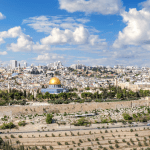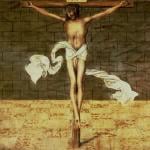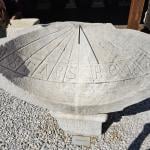 Monday: Read John 20:1-31
Monday: Read John 20:1-31
John 20-21 serve as the climax of the Gospel. The promises made earlier in the Gospel are fulfilled here. John begins by noting that it was the “first day of the week” (1, 19). This might not appear too surprising until we realize that we probably already knew that. The fact that John repeats it in 20:19 tells us that he really wants us to know that it is the “first day of the week.”
We are reminded of the fact that John begins his gospel with an allusion to the creation account: “in the beginning” (1:1). What, then, is the significance of it being “the first day of the week?”
For John, the answer is that it is the first day of the new creation! That the theme of new creation pervades this account is further evidenced by the fact that Mary mistakes Jesus for the “gardener” (15)—recall that Adam and Eve were gardeners” they were to “cultivate and keep it” (Gen 2:15). Thus, Jesus is the new Adam who is “gardening” in the new Eden!
The theme of new creation reaches its height in the account of Jesus’ appearance with the disciples that evening. John notes that Jesus, “breathed on them and said to them, ‘receive the Holy Spirit’” (22). The language of “breathing” on them is identical to the language used in Gen 2:7 where God “breathed”[2] on Adam and he “became a living being.” Thus, just as God formed the original humanity by giving him the Spirit, so now Jesus forms His disciples—into a new creation—by giving them the Spirit.[3]
As a result of the giving of the Spirit to His disciples Jesus now sends them out: “As the Father has sent Me, I also send you” (21). This is the final step in the missional story of the Gospel of John. Just as Jesus was sent by the Father, so now He sends them.
Questions to ponder/discuss:
- The Gospel of John has been winding its way to this point from the beginning. The goal has been for the Father to be made known (1:18). Jesus has done this! Thus, He tells the disciples that “He who has seen Me has seen the Father” (14:9). But the mission is not complete. The nations still need to know! Consequently, Jesus now sends them! And by extension, they send us!
- What does it mean to be sent by Christ on His mission? It means that we are called to bear God’s image (remember that John is set in the context of ‘new creation’). We are to make God known by reflecting His image to creation. This does not require a person to go into the ministry. We are in the ministry. The characteristic feature of this ministry is that we are to love like Jesus did: “By this all men will know that you are My disciples, if you have love for one another” (13:35). When we take up our crosses and love others the way Christ loves them and the way He loved us, then we make Him known!
- Thank goodness He gave us the Spirit to carry this out!
Tuesday: Read John 21:1-25
John 21 is the epilogue. In this chapter, Jesus appears in Galilee with His disciples. This may be John’s way of filling in the details that are omitted from Mark’s gospel. Mark ends with the women being instructed to tell the disciples that, “He is going ahead of you to Galilee; there you will see Him, just as He told you (15:7). In Mark’s Gospel, however, (as far as we can tell) this does not actually happen—recall that the present ending(s) of Mark is not the true ending of the Gospel.[4]
By providing us with the story of Jesus and the disciples in Galilee, the Gospel of John comes full circle. Jesus began His ministry in Cana of Galilee (2:1). Now, the story ends in Galilee.
The great catch of fish is a bit intriguing. It is quite likely that John’s intent in providing us with this story of the catching of 153 fish (11) relates to the mission of the disciples to the nations. There have been a number of speculations as to the significance of “153.” The most likely conclusion is that the number 153 represents the totality of the nations of the world.[5] Thus, the haul of 153 fish represents the faithful mission of the people of God to the nations.
Finally, Jesus restores Peter. Just as Peter denied Jesus three times, so now Peter confesses Him three times (15-17). Note the reference to the charcoal fire (21:9), which Peter was warming himself by when he denied knowing Jesus (18:18).
Questions to ponder/discuss:
- Peter’s restoration is a great reminder that no one has ever strayed so far from Christ that they cannot be restored. As we close the Gospel of John and recognize that we are all called to partake of His mission, we would do well to be reminded that Christ stands ready to forgive and restore us.
- Once we are forgiven and restored, then we are empowered by the Spirit to accomplish His work. We have nothing to fear because He is with us and if we need anything all we must do is ask (see John 14:12-31)!
Wednesday: Read Acts 1:1-26
The book of Acts covers the events from the resurrection of Jesus (AD 30) to Paul’s imprisonment in Rome (AD 60-62). It is, however, much more than a mere history of the first Christians. That it is titled, “the Acts of the Apostles” is a bit of a misnomer. After all, it doesn’t address the apostles per se: the account only follows Peter (and briefly John) and Paul. The opening of Acts (1:1-2) certainly links it to the Gospel of Luke. Instead, it might be known as “the Acts of Jesus through His Spirit empowered followers.” As we will see, the acts of the Apostles are modeled on the acts of Jesus. That is, what Jesus does in the Gospel of Luke, Peter and Paul do in the book of Acts.
Luke explains that Jesus appeared to His disciples over a period of 40 days (1:3: technically it would be 38 since the first two days he was in the tomb). Jesus implores them not to leave Jerusalem until they have received the Holy Spirit.[6] The disciples ask Jesus, “when” is He going to restore the kingdom to Israel? (6). Jesus replies that they do not need to know when, they just need to wait in Jerusalem until the Holy Spirit comes (7-8). The Holy Spirit came 10 days later (2:1).[7]
Acts 1:8 serves as the thesis statement of the book of Acts and as the basis for understanding the narrative outline of the book. Luke will chronicle the coming of the Spirit and the sending of the disciples from Jerusalem, to Judea and Samaria (the southern and central regions of the local area), and then to the ends of the earth. For Luke, “the ends of the earth” was Rome. That the book of Acts ends with Paul in Rome may very well have meant that for Luke, the mission was accomplished.
Finally, note that the book of Acts is framed with references to the kingdom of God (1:3; 28:31). The kingdom of God is not merely something Jesus did and talked about. It is also what the people of God, by the power of the Spirit, continue to do and teach.
Questions to ponder/discuss:
- How much of our lives do we spend “trying” to do what the Lord asks of us by our own power and ability? We too must be empowered by the Spirit daily to accomplish His work. Make it your goal to start each day with, “Lord, equip me today to see as you see, hear as you hear, feel as you feel, and to do as you would have me do.” Remember, there is no secret sauce to knowing and doing God’s will. He simply desires to go with us where we go. As we go, we are to “fear the Lord”—which is the beginning of wisdom—and to go in love!
Thursday: Read Acts 2:1-36
On the day of Pentecost (meaning “50”; because Pentecost is 50 days after Passover), the Holy Spirit descended upon those who were gathered (1-3). The presence of “a violent wind and tongues of fire” recalls the presence of God as a pillar of fire by night and the cloud by day in the Exodus account.
The pouring out of the Spirit fulfills what the prophets had anticipated (see: Isa 32:15; 44:3; Ezekiel 36:27; 37:14; 39:29; Joel 2:28-29). This is the moment of Israel’s restoration that the disciples were asking about (cf 1:6; note: there were Jews from every nation: 2:5). In Ezekiel 36, the prophet notes that God will gather His people from all the lands in which they were scattered (note: the list of nations in Acts 2:9-11). Those who gathered at Pentecost represent the return of Jews from all directions! Richard Bauckham notes that the list of nations (2:9-11) is in four groups of nations that “correspond to the four points of the compass with Jerusalem (Judea) central.”[8]
Peter explains to those present what was happening. In doing so, he cites Joel 2:28-32—which looked forward to the restoration of Israel. Interestingly, Peter begins his speech with “in the last days” (17). The prophecy in Joel simply begins with “after this” (Joel 2:28). The pouring out of the Spirit is one of the distinctive features of the new covenant (read Ezek 36:24-27!!). The prophet Ezekiel said that God will “put a new spirit within you” (Ezek 36:26). The result will be a transformed heart!
Peter also stresses that the coming of the Spirit will be “on all people” (17; cf Acts 10:45; and Num 11:29 “I wish that all of God’s people were prophets”). No longer will there be distinctions in gender (“sons and daughters”; 17), age (young and old; 17), or socioeconomics (servants; 18). In fact, Peter adds, “they will all prophesy” (18; cf Num 11:29).
Luke also depicts the descent of the Spirit in light of the reversal of the tower of Babel (Gen 11:1-9). All of those present began to speak “with other tongues” (4). What is unclear is if they all spoke in different languages or if those in the crowd that gathered simply heard them in their own language” (6). In light of the reversal of Babel theme, it may be that they spoke one language, and everyone heard them in their own tongue.
Questions to ponder/discuss:
- This account has been the source of much debate within Protestantism over the last 100+ years. Without endeavoring to enter the debate, I would simply note that we should not diminish the significance of the coming of the Spirit, nor of His empowering of God’s people to fulfill the mission of making God known. Nor should we so emphasize the coming of the Spirit to the point in which we make it merely a matter of personal experience and neglect the Spirit’s empowering of God’s people to serve. Whatever your convictions of the Spirit in the life of the church today might be, I would encourage you to begin each day asking for the Spirit to fill you anew!
Friday: Read Acts 2:37-3:36
Acts 2:42 is often considered a template for the life of the early church. We should be careful about putting too much weight on a verse that is not central to the overall thrust of the text. Nonetheless, the early church appears to have focused on the Word, fellowship, communion,[9] and prayer.
The speeches, miracles, and actions of Peter (and John) and Paul in the book of Acts must be viewed from the background of the Gospel of Luke. Luke intentionally structures the book of Acts in order to parallel the Gospel of Luke. In doing so, Luke is more than just portraying Peter and Paul to be like Jesus. Instead, Luke is showing the disciples and the early church as continuing the work of Jesus.
Peter and John heal a man who was born lame and had been at the temple gate “every day” (3:2)—we learn that this lasted 40 years (4:22). This raises the question, of whether Luke intended for us to ask or not is uncertain, as to why Jesus never healed him? Surely Jesus had to have passed the man on His way to the temple. Peter and John reply to the man’s request, “I do not possess silver and gold, but what I do have I give to you: In the name of Jesus Christ the Nazarene—walk (3:6)
There is an ironic account told by Thomas Aquinas more than 1,000 years later. He notes that Pope Innocent III, who as Pope had become immensely wealthy, quipped to him, “You see, the Church is no longer in that age in which she said, ‘Silver and gold have I none.’” To which Thomas replied, “True, holy father, neither can she any longer say to the lame, ‘Rise up and walk.’” Sad, but true!
Questions to ponder/discuss:
- Much of the church today has lost sight of the power of the Spirit. Too many Christians are afraid of the hyper-emotionalism and sensationalism that often accompanies those in more charismatic circles. As a result, we have lost the miraculous. Lest we forget, we believe in a God that still does miracles.[10] Sure, God may not respond to our request with a miraculous intervention. But He certainly won’t if we never ask.
NB: our goal is to keep these posts free of charge. I do not intend to ever hide them behind a paywall. I can only do this if those of you who have been blessed by them and can afford to give ($5, $10, $25, or more/month) do so. You can give a tax-deductible contribution by following this link.
Please share this post and let others know about determinetruth.
If you wish to view this blog on your smartphone through the Determinetruth app simply download the “tithe.ly church” app on your smartphone and insert “determinetruth” as the church name you wish to follow. Once it is loaded, simply click on the “blog” icon and it will automatically load.
If you would like to have Rob speak at your church or organization in person or via zoom, please let us know by filling out the contact info on the Contact me tab on this site.
[1] This guide is meant to be done either as a group study over the course of 2 or 4 meetings (Day 1-5; 6-10; 11-15; 16-20), or as a private devotion over the course of 4 weeks (or a calendar month—5 lessons per week).
[2] The word used in John is identical to the word used in the Greek version of Gen 2:7; cf Ezek 37:9-10.
[3] This is also the fulfillment of Ezekiel’s vision of the valley of dry bones that come back to life! cf Ezek 37:9-10.
[4] As far as we can tell the ending of Mark’s gospel was lost. All of the oldest manuscripts of Mark break off abruptly in 16:9.
[5] When it comes to numbers like this, it is reasonable to suppose that the number has some significance. It is too random not to. At the same time, we must be careful about wild speculations. Whatever the meaning of such a number, assuming that there is one, it should only serve to enhance the meaning of the text.
[6] Coming off the Gospel of John you might be wondering if they have already received the Holy Spirit. Well, in John’s account they have. John simply pushed forward what Acts says happened on the day of Pentecost because the Gospel of John ends. What I mean by this is that John narrates the coming of the Spirit but didn’t want to narrate 50 more days of events. So, he pushed the Pentecost scene forward. This may be problematic for us if we expect the Gospels to be writing history in accord with our standards of precision. The problem is not with the Gospels. The problem is with our assumption that they are following our rules.
[7] Some suggest that the kingdom did not come at Pentecost. Instead, they suppose that Jesus’ answer to the disciples’ question is related to His return. The context, however, suggests that the coming of the Spirit is in view! And the Spirit came 10 days later!
[8] Bauckham, Acts in Palestinian Setting, 417.
[9] That communion is in view here fits well with the context. They were “breaking bread” which is another way of saying there were eating a meal.
[10] I recognize that there are some who hold to a “cessationalist” view which believes that all “signs” of the Spirit ended either at the end of the reign of the Apostles, the completion of the NT, or some other specified event.













